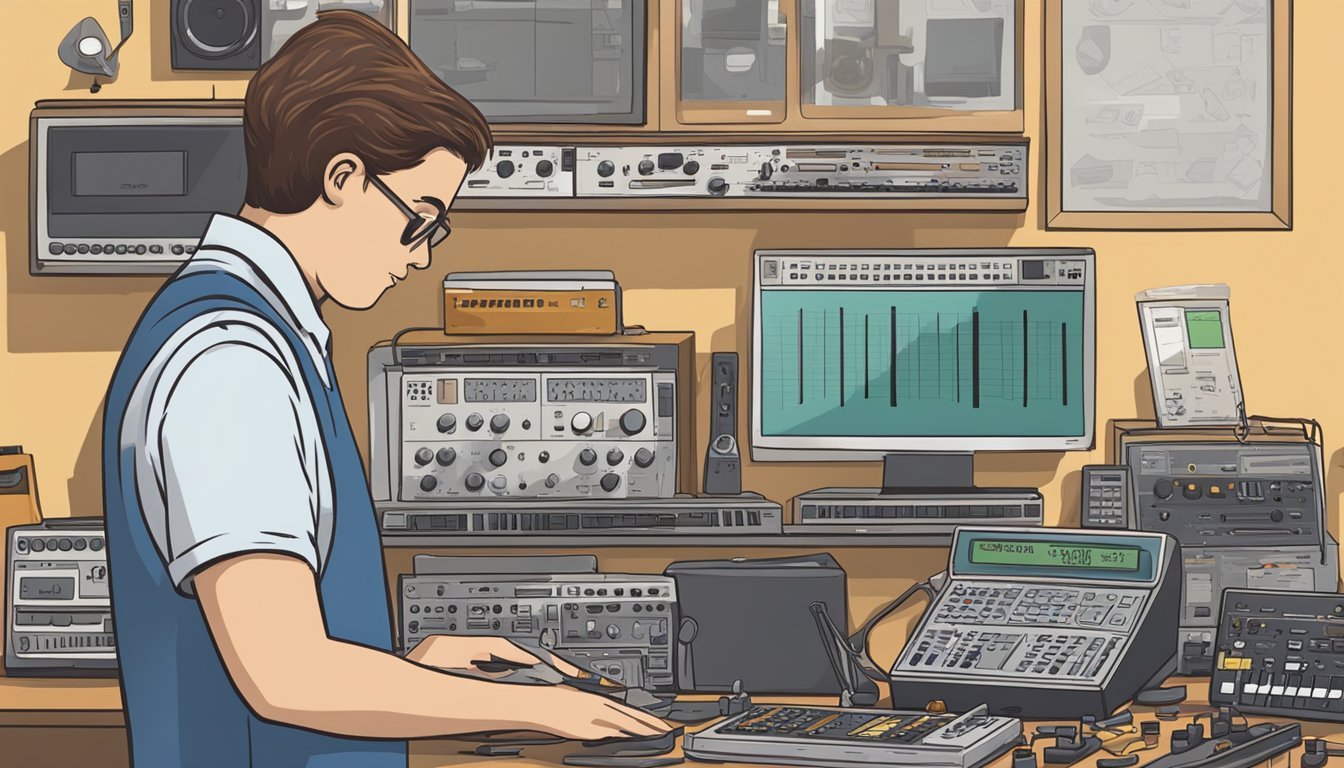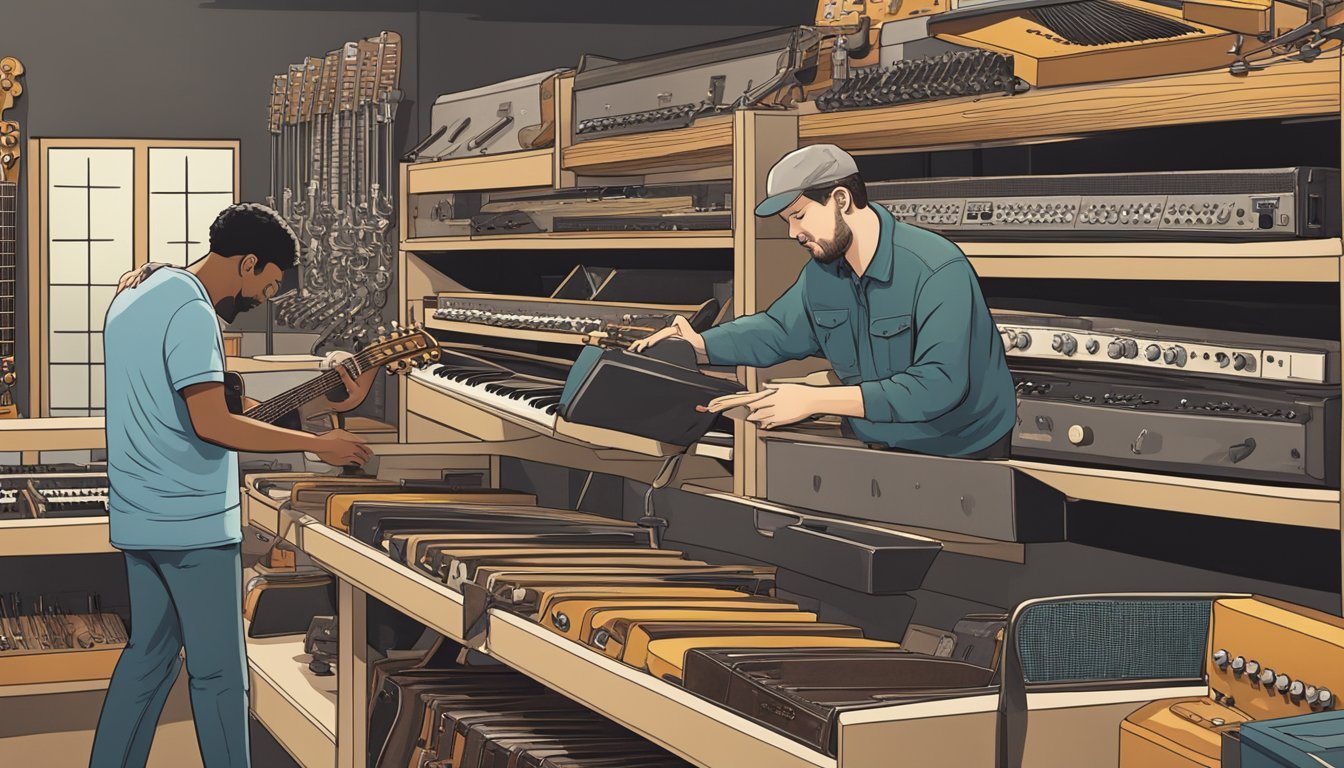Selling or trading in your used gear can be a great way to get some cash or upgrade your equipment. Guitar Center typically offers about 40-60% of a used item’s value, depending on its condition and demand. If you’re thinking of trading in your old guitar or amp, you’ll want to know how much you can expect in return and if it’s the best deal out there.

Navigating the trade-in process can feel a bit tricky.
From appraising your gear correctly to exploring alternatives, it’s important to understand your options.
This article dives into the details of what Guitar Center pays, how they evaluate your equipment, and whether selling to them is the right choice for you.
Key Takeaways
- Guitar Center pays around 40-60% of your gear’s value.
- Knowing your gear’s worth helps in negotiations.
- Explore other selling options to maximize your return.
Understanding Guitar Center’s Trade-In Program
Guitar Center makes it easy for you to upgrade your music gear through their Trade-In Program.
This program allows you to turn your used instruments into credit for new gear, while also promoting sustainability by giving your old items a second life.
What is Trade-In?
Trade-in refers to the process where you bring your used musical equipment to Guitar Center.
They assess its condition and value before offering you a trade-in value.
You can use this value toward new purchases in-store.
This option is often more convenient than trying to sell items on your own.
Plus, it helps reduce waste by keeping gear in circulation.
How the Trade-In Process Works
To start, you bring your used gear to any Guitar Center location.
The staff will evaluate your item based on its condition and current market demand.
They will typically offer you between 50% and 60% of the retail price, but this can vary depending on brand and rarity.
If you agree to the offer, you can instantly use that trade-in value as credit toward new items.
You will either receive a store credit or opt for cash, especially if the value is under a specific amount.
Benefits of Trading In at Guitar Center
Trading in your gear has several perks.
First, it’s a hassle-free way to get cash or credit for your old items.
You avoid the challenges of online selling, like negotiating and shipping.
It also supports sustainability by ensuring your old equipment can be reused or recycled instead of ending up in a landfill.
Additionally, Guitar Center often has promotions, so the trade-in value might be even better than usual.
This is a win-win situation for anyone looking to refresh their music gear.
Appraising Your Used Gear
When you’re ready to sell or trade in your used gear at Guitar Center, knowing what affects its appraisal can really help.
Several factors influence the resale value.
Here’s a closer look at what you should consider.
Condition is key; instruments that are well-maintained and free from significant damage typically fetch a higher price.
Additionally, brand reputation plays a significant role, as popular models often have a better resale market.
For those curious about specific instruments, there’s even a guide available online where ‘keith urban guitar value explained’ offers insights into how his signature models hold their value over time.
Factors Affecting Resale Value
The resale value of your used gear is influenced by several key factors.
First, brand and model matter a lot; some brands hold their value better than others.
For example, high-end brands like Gibson or Fender often yield higher offers.
Market demand can change what buyers are willing to pay.
If something is trendy, you might get more cash.
Condition is also crucial; gear that shows signs of wear, such as scratches or rust, typically has a lower value.
In addition to this, if you still have the original packaging and accessories, it can boost your gear’s worth significantly.
Consider these elements carefully as you prepare.
Vintage vs. Modern Musical Equipment
The age of your musical equipment plays a big role in how much Guitar Center might pay you. Vintage gear, typically items that are over 30 years old, often has a higher resale value than modern pieces.
Collectors are willing to pay more for older instruments due to their rarity and unique sound.
On the flip side, modern gear can also have value, especially if it’s a popular model or in high demand.
However, it may not always match the value of vintage items.
Research the current market value of both vintage and modern gear to find out where your equipment stands.
Preparing Your Gear for Appraisal
Before you take your gear for appraisal, getting it ready can make a difference in the offer you receive.
Start by cleaning your instrument or equipment thoroughly.
Dust and grime can make it look less appealing and lower its value.
Next, gather any accessories or original packaging that came with it.
This can include cases, manuals, or cables.
Having these items shows that you’ve cared for your gear, which can lead to a better offer.
Finally, be ready to answer questions about the condition and history of your gear.
The more information you provide, the easier it is for Guitar Center to assess value accurately.
Alternatives to Selling at Guitar Center

If you’re looking to sell your used gear, there are several alternatives to consider.
These options can often lead to better prices and more control over the selling process.
Here are some effective choices you can explore.
Private Sale Options
Selling your gear privately can be rewarding.
You set the price and keep all the cash.
Start by taking clear photos of your items and writing detailed descriptions.
This is where platforms like Facebook Marketplace or local classified ads come in handy.
Be ready for negotiations.
Many buyers will try to lower the price, so have a minimum amount in mind.
Meeting in a public place for safety is a smart idea.
Using platforms like Craigslist can also reach buyers in your area quickly.
Comparing Online Marketplaces
Online marketplaces like eBay and Reverb.com are great options if you want to reach a larger audience.
On eBay, you can auction your gear or set a fixed price.
Both methods can attract different types of buyers.
Reverb.com focuses solely on music gear, making it more specialized.
Plus, it often caters to music enthusiasts who may be willing to pay more.
Just remember to factor in shipping costs and fees since these can affect your overall profit.
Trade Up or Cash Payout?
Considering whether to trade up or cash out is important.
Many stores offer trade-in options that give you credit toward new gear.
If you’re looking to get something new, this can make sense.
On the flip side, if you need quick cash, selling for a payout is better.
Guitar Center can pay up to $1,000 for used gear, but other local shops might give you better offers based on their current inventory needs.
Remember, cash payouts mean less hassle, but trading in can give you a better deal on your next purchase.
Getting the Most from Your Trade-In
When you trade in your gear, understanding a few key factors can help you get the best value.
Knowing how to negotiate, taking care of your equipment, and recognizing what influences pricing can really boost your trade-in value.
Negotiating Your Trade-In Value
Don’t be afraid to negotiate when you go to a local Guitar Center.
You might start with the trade-in value they offer and see if they can give you a little more.
Researching the market value of your gear before heading to the store can give you a solid reference point.
Look at listings on sites like eBay or Reverb to find prices for similar items.
If you find evidence that supports a higher value, be sure to bring it with you.
This can strengthen your case during the trade-in process.
The Role of Condition and Accessories
The condition of your musical instruments and music gear plays a big role in how much you’ll get.
Make sure your items are clean and well-maintained.
A guitar amplifier that looks good and functions well is more likely to fetch a better price.
Including original accessories, such as cases or manuals, can also add to your trade-in value.
For example, if you have the original box for your studio gear or PA systems, be sure to include that too.
It can show potential buyers that you took care of your equipment.
Maximizing Value for Different Types of Gear
Different types of gear may have varying trade-in values.
Guitars, for instance, can be worth more if they are from popular brands.
Vintage gear might fetch an even higher price, depending on its condition and demand.
When trading in studio gear or PA systems, providing a solid description of the equipment and any additional features can help.
For example, a well-documented history of usage or maintenance can give your trade-in more weight.
Always be ready to show that your gear is not just working, but in good shape too.
Frequently Asked Questions
When you’re thinking about selling or trading in your gear at Guitar Center, you probably have a few questions.
Understanding their payout methods, trade-in processes, and other details can help you make the best choice for your used instruments or equipment.
What’s the typical payout from Guitar Center for secondhand instruments?
Typically, Guitar Center pays around 40-60% of the used value for secondhand instruments.
The exact amount can depend on factors like brand, condition, and market demand.
Can you trade in gear at Guitar Center and how does it affect the amount you get?
Yes, you can trade in gear at Guitar Center.
Generally, trade-ins might give you a better deal compared to selling outright, as you may receive credit toward new purchases, though the cash value could be lower.
Is it true that Guitar Center offers cash for used music equipment?
Yes, Guitar Center does offer cash for used music equipment.
However, the amount you receive in cash may be less than what you’d get if you opted for trade-in credit.
How does Guitar Center determine the value of used guitar pedals?
Guitar Center assesses used guitar pedals based on their condition, brand, and market trends.
They usually compare similar items to set a fair price.
Are Guitar Center’s buyback prices for used gear negotiable or fixed?
Guitar Center typically has fixed pricing for their buyback offers.
There’s usually not much room for negotiation, so it’s wise to know the market value of your gear ahead of time.
What’s the deal with returning previously owned gear to Guitar Center?
Returning previously owned gear to Guitar Center can be tricky.
They usually have a return policy for used items, but conditions apply.
Make sure to check the specifics before making a purchase.

